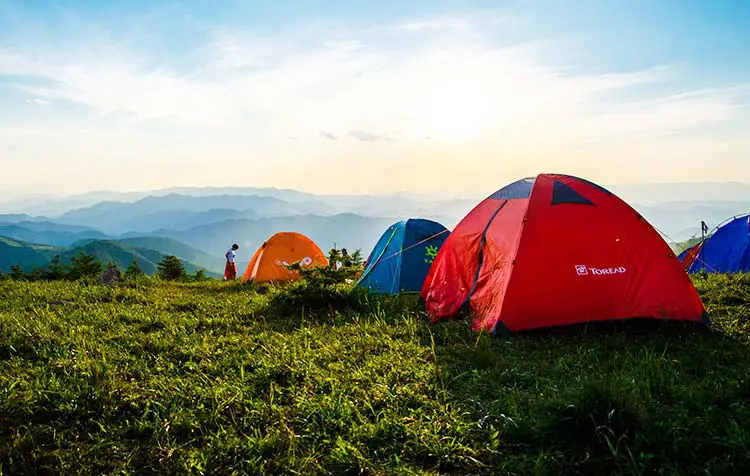Do you want to know how you can plastic free camping can? Then you are exactly right here. A time out in the countryside - untouched nature, peace and quiet and at the same time experience some exciting adventures. Camping is not only a great way to recharge your batteries and enjoy the beauty of nature, but also (compared to a long-distance flight or a cruise) a climate-friendly way to travel, sustainable vacation experience. Nevertheless, it is difficult for us to behave in an environmentally friendly manner, especially when it comes to this type of vacation. Disposable tableware, plastic packaging for eating and drinking, as well as many plastic tubes in the toiletry bag cause a lot of waste, which is often considered to be Plastic waste in the environment ends.
With the following 12 tips for zero waste camping, I'll show you how you can also manage to avoid unnecessary waste when camping.
Tip: If a waste-avoiding attitude is rather new territory for you, you are also welcome to take a look at the basic rules of the Zero Waste Lifestyle throw
The best tips for Zero Waste Camping
Besides a few Karma points you can also get a lot of new experience for a plastic-free camping. environmentally friendly lifestyle collect. Here you will find, as promised, the best tips and advice for this. Let's go!
1. take your own water bottle with you
If you spend a lot of time outdoors, you should also make sure you drink enough. To avoid disposable plastic bottles, it is always worth having your own Stainless steel drinking bottle (or a glass bottle) with you. You can fill it up at campsites, restaurants or public water fountains. For longer trips (and if you have enough space) a water tank is worthwhile.
From experience I know that when camping sometimes you still can not get around the plastic bottles from the supermarket. If that's the case, make sure that you buy a large canister rather than many individual bottles and then dispose of them correctly.
If you really want to enjoy the tranquility of nature completely isolated, a water filter or a so-called Lifestraw can be practical. With these you can free the water from lakes or rivers from germs, chlorine and organic pollutants and thus make it drinkable.
2. coffee mugs/ thermos flasks for warm drinks
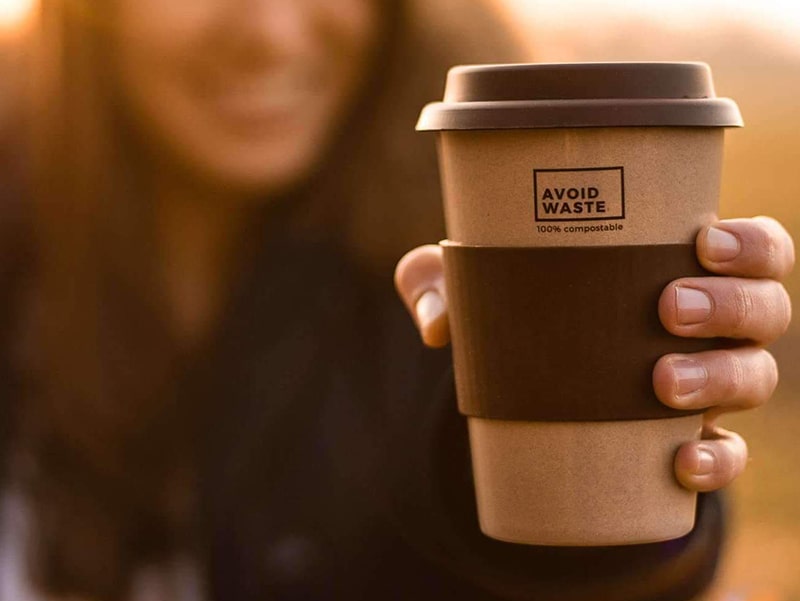
A few warming drinks should not be missing on an outdoor trip. To keep your coffee or tea warm longer, I recommend thermos flasks (which in turn also keep cold water cool). With a Reusable cup you can also get a coffee on the way, without having a guilty conscience because of the many disposable cups. This is also part of plastic-free camping.
3. store food in reusable cans
Especially for hikes is a Stainless steel lunch box super suitable to take a bit of provisions with you. Even more space-saving are coated bread bags or OilclothsYou can wrap your sandwiches in them, for example. In reusable cans you can also store a few leftovers after cooking in the evening and thus reduce food waste.
Tip: You can find more tips about this in the article about the Reduction of food waste.
4. bring your own dishes and cutlery
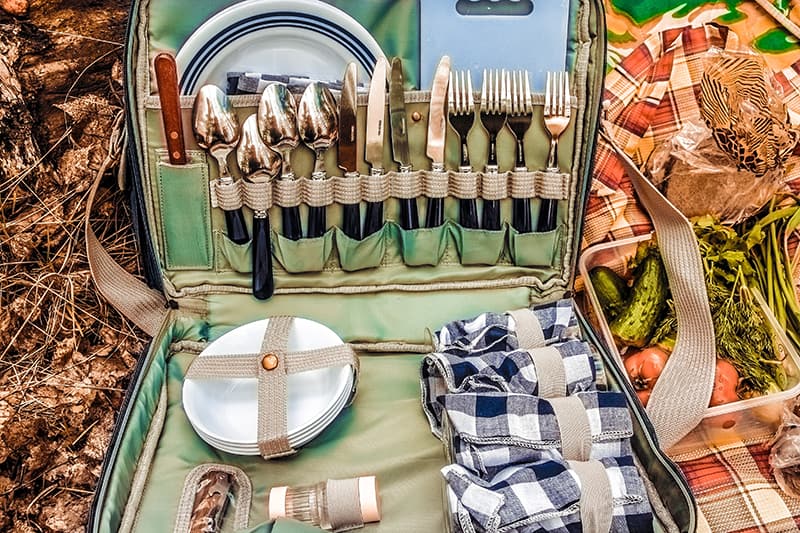
With your own tableware and cutlery you save unnecessary disposable products. Lightweight tableware (e.g. made of bamboo) and multifunctional travel cutlery (e.g. knife, fork and spoon in one) are very practical. But of course, you don't have to equip yourself with every possible outdoor gadget, but can also use your Cutlery set take from home.
5. use cloth towels
A Fabric napkin a dish towel for drying or a quick wipe-up, a cloth handkerchief for blowing your nose - as you can see, there are many ways to replace the disposable kitchen roll or handkerchief package with reusable cloth alternatives. Cloth tissues are the absolute all-purpose weapon of waste prevention - not only for zero waste camping.
6. take basic provisions unpacked
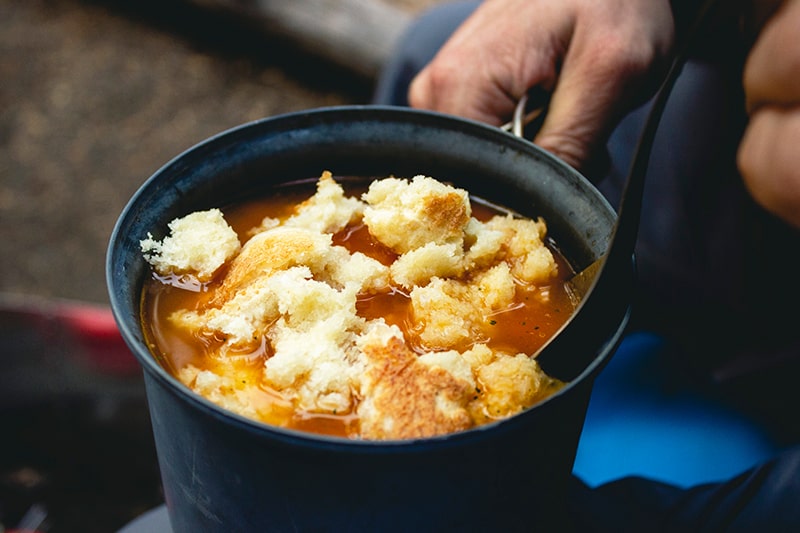
Depending on where you set up camp, it may be difficult with the plastic free shopping become somewhat difficult. There are often smaller supermarkets near campsites, but even in the city you know the sometimes very limited unpacked assortment. To avoid a "plastic emergency purchase", you can bring some basic provisions from home - for example bread, spreads in jars, vegetables and fruit, pasta, rice and sauces in jars.
7. take cloth bag for shopping
If you're traveling for a longer time, you can't take all your provisions with you. To save on plastic when you go to the nearest supermarket, you can simply take a few cloth bags or Fruit and vegetable nets from home and thus at least buy fresh food plastic-free.
8. sink with reusable utensils
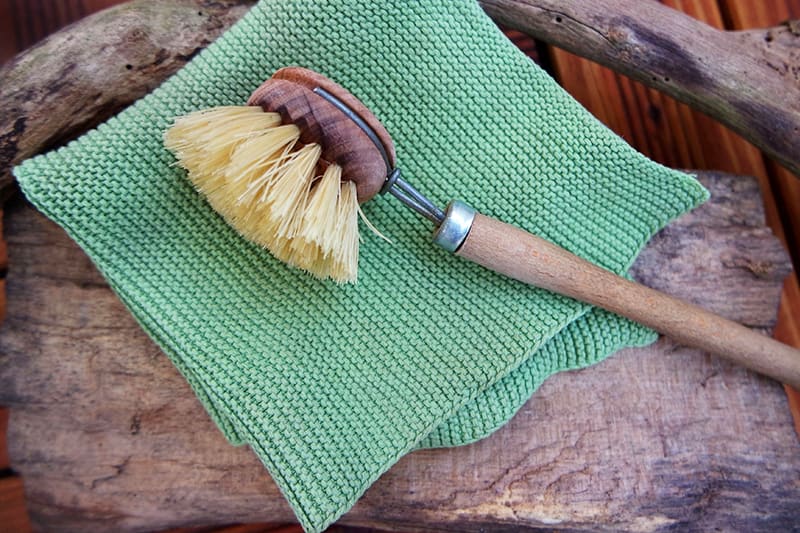
It's also worth bringing sustainable alternatives for washing your dishes. A reusable cotton dishcloth or a Wooden dish brush not only replace the disposable variants in your own household, but also help you save waste when you're out and about.
9. fill rinsing agent and washing powder in advance
To avoid having to resort to small travel tubes of washing powder and cleaning bottles at the nearest supermarket, fill a little bit at a time of your supplies into small jars or cans at home.
But you can also simply within a few minutes Making washing up liquid from ivy yourself. Also Washing powder is in own production possible. This makes plastic-free camping even more educational.
10. use solid shampoo and a bar of soap
You can also save a lot of plastic waste with your cosmetic products if you opt for solid soap and shampoo bars or Hair soap decided. You can find these in unpackaged stores and now also in every drugstore in cardboard packaging. The great thing about solid soaps and shampoos is not only the saved plastic, but also that they are particularly compact, fit in any bag and last longer than the liquid version. For me, an absolute must when zero waste camping.
11. brush your teeth with a bamboo toothbrush and toothpaste tablets
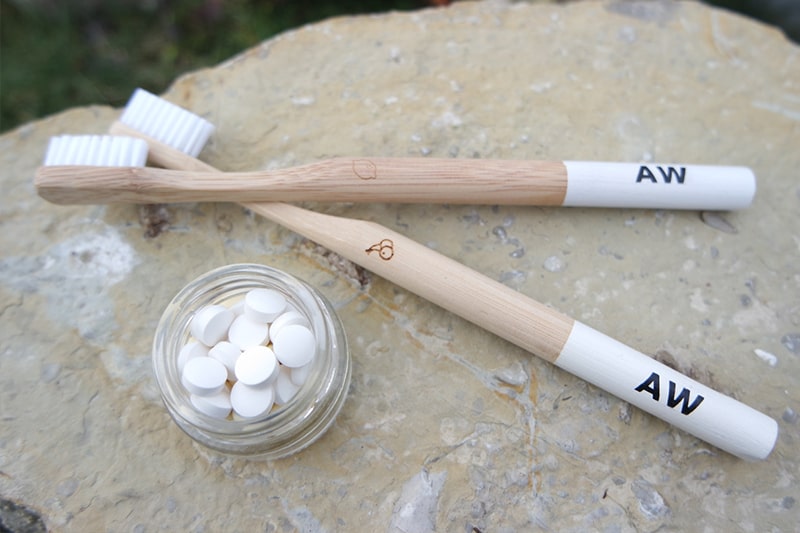
Use a Bamboo toothbrush and take in a small tin tooth powder or Toothbrush tablets with. Toothpaste tablets are particularly practical because they are not only small and quick to stow away, but can also be portioned exactly for your trip. You can also save plastic waste by using toothpaste in a jar.
12. deodorant in glass
You can already buy plastic-free spray deodorant or deodorant cream in glass bottles and jars at the drugstore, or filled in unpackaged stores. Here at CareElite, you'll also find a simple guide on how to make your make natural deodorant from home remedies yourself can. Especially convenient here is also that you can make only the amount you need for your camping trip and thus avoid unnecessary ballast.
Important: If you are in direct nature, without sanitary facilities nearby, make sure that your cosmetics contain only natural, biodegradable ingredients to avoid leaving chemicals in nature. This applies to all products you use for rinsing, washing and body cleansing. Microplastics in cosmetics you unmask, for example, with the smartphone App Codecheck.
Waste separation and disposal when camping
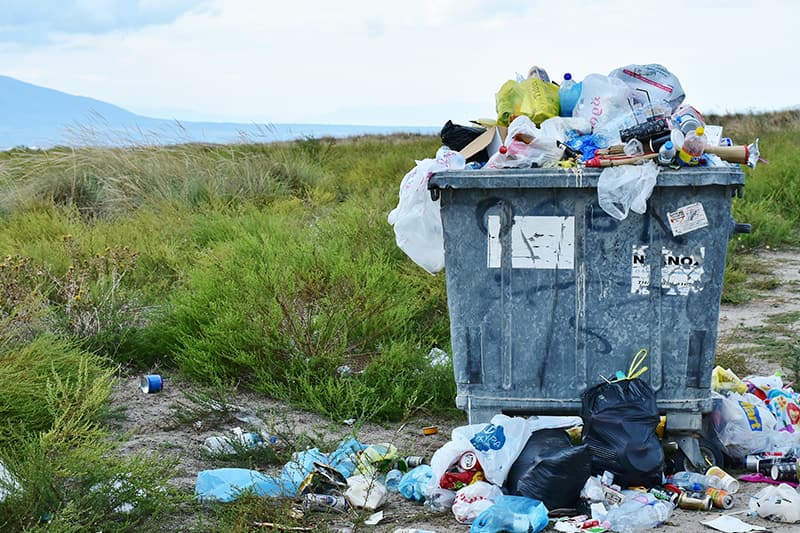
Of course, it's great if you manage to get through your camping trip completely zero waste, but as always, don't stress too much and try your best. If you do end up with some trash, be sure to check out the correct waste separation and disposal. It's best to collect it and dispose of it at the next opportunity at a rest stop or campsite. Unfortunately, there are not yet waste separation containers everywhere. If you have the space, take your trash home and separate it properly there. Helpful are in any case 2 bags brought along, in order to at least directly on the spot Plastic and separate residual waste.
Plastic-free camping without garbage - is that possible?
Plastic-free camping without leaving behind big piles of trash can definitely work. As you've read, with a little preparation and a few more products you take from home, you can save a lot of Save plastic. With Zero Waste Camping you save resources, do something good for the wonderful nature and can enjoy your trip with a clear conscience.
Have you been on a plastic-free camping vacation yourself and have any other tips for avoiding waste while camping? Feel free to share your experiences and tips in the comments.
Stay sustainable,

PS.: This article is in collaboration with Avoid Waste* originated. Look gladly times in the store of the mark past, since there plastic-free is capitalized.

